Google offers a lesser-known advanced search command that could make your Google searching a whole lot easier.
While it’s possible to use Google’s Tools menu to do the same thing, it takes six clicks to do what advanced search operators accomplish with one click.
Advanced Search Operators
Advanced search operators (otherwise known as search commands) are ways to refine your search in order to get a more specific result.
For example, if you want search results from a specific website, you can use the site: search operator.
Example of the site search operator:
apples site:example.com
The above search will return all webpages on the example.com website that contains the word “apple” in them.
Now, here is how to do the same search, but this time we want to find results about “apple” but not from example.com.
To do that, we do the same search but with the minus sign (-).
Example of site exclusion search operator:
apple -site:example.com
Before: And After: Search Operators
The advanced search operators that Google introduced in 2019 are called the before: and after: commands.
What these search commands do is make it easier to find webpages that are published within a specific period of time.
These kinds of time-based searches help a user to find webpages that were published during a specific time period.
There was already a way to accomplish this time-based task by using an advanced search tool available on Google’s home page.
But, using those tools takes six clicks to accomplish a time-based search.
The old way to do it is to first click on the Tools button located below and to the right of the search box:
 Screenshot by author, May 2022
Screenshot by author, May 2022Then, the next step is to click the “Any time” link.
 Screenshot by author, May 2022
Screenshot by author, May 2022The third step is to enter a custom date range in the pop-up calendar box.
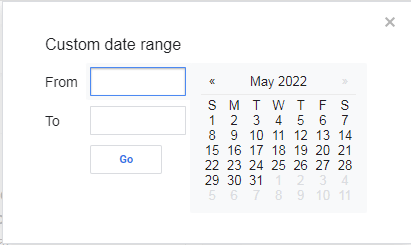 Screenshot by author, May 2022
Screenshot by author, May 2022That’s a lot of typing and clicking in order to search for a document that was published within a specific time frame.
The New Way To Accomplish Time-Based Searches
The new way to search is similar to using the other advanced search operators, like the “site:” search operator example above.
The before and after search commands look like this:
before: after:
These are examples of how to use the before and after search commands:
spider man before:2005 spider man after:2005 spider man after:2005-01-01 before:2019-31-12
Note: If you’re using the full dates, the search has to be done in the year/month/day format.
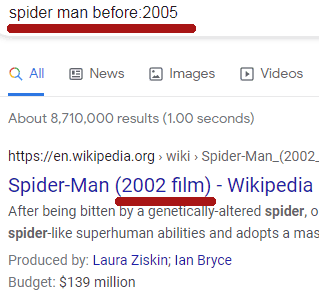 Example of spider man before:2005
Example of spider man before:2005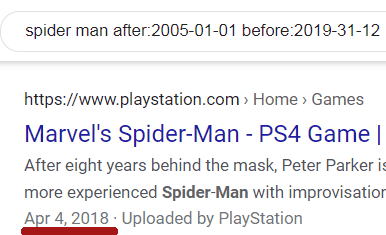 Example of multiple calendar dates
Example of multiple calendar datesWhat The Before & After Search Operators Mean
The advanced search operator “before:2019” means before 01/01/2019.
This is a screenshot of a search using the “before:” advanced search operator:
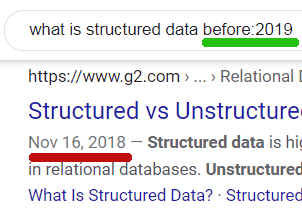 Screenshot from search, Google, May 2022
Screenshot from search, Google, May 2022Notice how the above search result has a date of November 16, 2018? That’s because Google is returning webpages from before 01/01/2019.
This is the same search but restricted to results from before 2018:
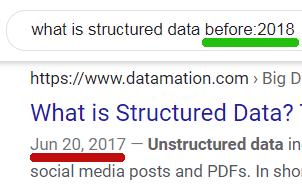 Screenshot from search, Google, May 2022
Screenshot from search, Google, May 2022Similar to the previous search, what Google is doing with the “before:2018” search operator is returning webpages that were published before 01/01/2018.
How Dashes And Slashes Work
Something that’s really cool is that both a dash (-) and a slash (/) in the date also work.
So for this search:
avengers endgame after:2019/03/01 before:2019/03/05
You get this search result:
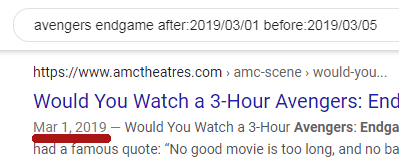 Screenshot from search, Google, May 2022
Screenshot from search, Google, May 2022Time-Based Search Operators Are Flexible With Numbers
Another useful feature is that when entering a date, it doesn’t matter if single digits are written with or without a zero.
This:
07
Works the same as this:
7
Are Dates Sometimes Wrong?
The publication date of the search result pages will not always be shown.
This was the case in 2019 when the before and after search commands were announced, and this continues to be the case today as of the publication of this article.
Also, sometimes there are search results that don’t seem to match.
For example, for the Spider-Man search like this:
spider man after:2005-01-01 before:2019-31-12
The search results should be no later than December 31, 2019.
But, if you look at the example below, there’s a result from 2021. Is the search operator broken?
Wrong Search Result?
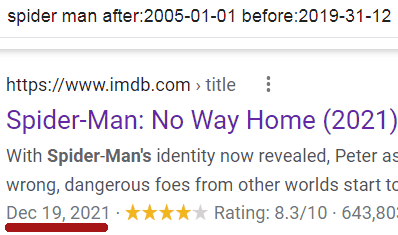 Screenshot by author, May 2022
Screenshot by author, May 2022The above search result is not broken. The above search result from the IMDB website appears to be from 2021, but that page was originally published in 2019.
 Screenshot of Archive.org Cache of 2019 IMDB Spider-Man Page
Screenshot of Archive.org Cache of 2019 IMDB Spider-Man PageSo, although the current webpage appears to say that it was published in 2021, the actual publication date was in late 2019 (as seen in the cache saved by Archive.org), when the IMDB created the webpage for the (at the time) untitled movie, that eventually came to be known as Spider-Man No Way Home.
Before & After Works In Google News
The date-based search operators also work in Google News.
This should make it easier to research news reports from specific date periods.
For example, WordPress is updated to version 6.0 (named Arturo) in late May 2022.
If I search Google News for WordPress Arturo from before 2022, Google news returns search results where the words WordPress and Arturo are on the news site. But nothing about the WordPress 6.0 Arturo update.
But, if I search for WordPress Arturo for the dates after March 2022, I get the news search results about the WordPress update.
Google News search like this:
wordpress arturo after:2022-03-01
Returns the correct search results:
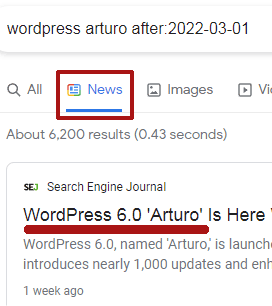
Before And After Dates Are Considered Estimates
At the time that the search operators were announced, Google’s Danny Sullivan said that it’s possible that Google might not get it right because it’s sometimes difficult to parse the actual publication date.
So, it was said at the time that the publication dates of search results that used the date-based search operators were to be understood as more of an estimate.
But as is seen with a little digging around, some of what appears to be mistakes in the date range are actually correct. It’s just that the articles were subsequently updated.
Save Time With The Before And After Search Operators
I have to admit that I have forgotten about the before and after search operators. I’ve never seen anyone talk about them since the announcement of these search operators.
Nevertheless, searching with date restrictions is a useful way to search, and it’s a good idea to become reacquainted with these search operators.
Citation: Read the tweet by SearchLiaison that announced the before and after search operator.
More Resources:
Featured Image: Golden Dayz/Shutterstock
 seolounge
seolounge